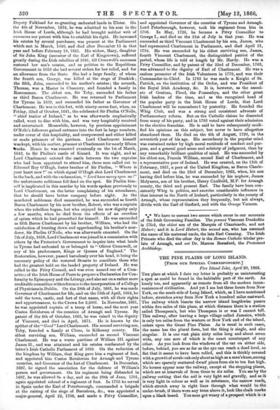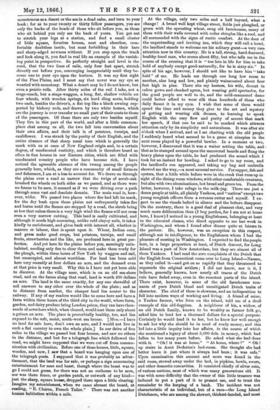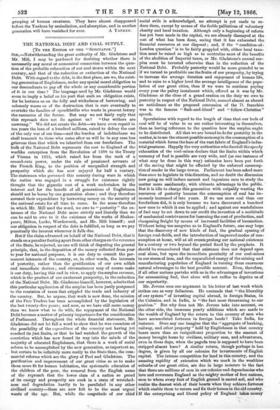Fire Island Inlet, April 20, 1866. THE place at which
I date my letter is probably as uninteresting a spot as could be found in the habitable part of the earth. As. lonely too, and apparently as remote from all the modern incon- veniences of civilization. And yet I am but three hours from New York, on the south side of Long Island, which, as I have mentioned before, stretches away from New York a hundred miles eastward. The railway which bisects the narrow island lengthwise passes. withinfive miles of this place, at which distance there is a station called Thompson's, but who Thompson is or was I cannot tell.. This railway, after leaving a large village called Jamaica, which is only ten miles from the western or New York end of the island, enters upon the Great Pine Plains. As is usual in such cases, the name has the plural form, but the thing is single, and also singular. It is one vast plain sixty miles long and about seven wide, any one acre of which is the exact counterpart of any other. As you look from the windows of the car on either side, before, behind, you see as far as the eye can reach a dead level, so flat that it seems to have been rolled, and this is thickly covered. with a growth of scrub-oak only about as high as a man's knee, among which are sparsely scattered dwarf pines from six to ten feet high. No houses appear near the railway, except at the stopping places, which are at intervals of from three to six miles. You see by the railway cutting that the soil is very light and gravelly, and as it is very light in colour as well as in substance, the narrow roads, which stretch away in right lines through what would be the under-brush, if there were any trees above it, look like chalk marks upon a black board. You soon get weary of a prospect which is Es monotonous tea desert or the sea in a dead calm, and turn to your At the village, only two miles
book ; for as to your twenty or thirty fellow passengers, you see change ! A broad well kept village street, fields just ploughed, or only the backs of the heads of those who sit before you, as those green with the sprouting wheat, snug old farmhouses, many of who sit behind you only see the back of yours. You get out them with their walls covered with cedar shingles like a roof, and to stretch your legs at a station, and find a small cluster all surrounded with the signs of rustic comfort. At the door of of little square, formless houses, neat and cheerless, coin- the unpretending and inviting inn, which they will call a hotel, fortable doubtless inside, but most forbidding in their bare the landlord stands to welcome me his solitary guest—a very rare and sharp-edged newness without. If you step upon the track attention now in this country. He is a tall, strong, hard-featured, and look along it, you find in real life an example of the vanish- healthy-hued man, who seems about fifty, but who tells me in the lag point in perspective. So perfectly straight and level is the course of the evening that it is " too late in life for him to take road, that the two lines of rails, only four feet apart, stretch hold of anybody except good-naturedly, for he is sixty-six." In directly out before you, converging inappreciably until they be- spite of his age, however, I should not like to have him " take come one to your eye upon the horizon. It was my first sight hold " of me. He leads me through one long low room to of the Pine Plains, and I must say that never was my eye so another, also long and low, and plainly wainscoated about four wearied with monotony. What a desert may be I do not know, but feet high in pine. There site my hostess, his wife, decent in even a prairie rolls. After thirty miles of the rail I take, not a calico gown and checked apron, but wearing gold spectacles, for stage-coach, but a stage-waggon, a long, flat, shallow vehicle on the good people are well to do, and the mild-mannered dame four wheels, with wooden springs, six hard sling seats, holding 'could better afford to wear silk than hundreds of those who two each, besides the driver's, a flat top like a black awning sup- daily flaunt it in my eyes. I wish that some of them would
ported by hickory rods, and drawn by two white horses, which spend the time and money they give to the art and mystery ere the journey is over transfer no small part of their coats to those of getting and wearing silk dresses, to learning to speak
of the passengers. Of these there are only two besides myself. English with the easy flow and purity of accent that mark They live in this part of the world, and after a little common- her speech, if that can be said to be marked which attracts place chat among us all, the two fall into conversation about attention only by its simplicity and naturalness. It was after six their own affairs, and their talk is of potatoes, turnips, and o'clock when I arrived, and as I sat chatting with the old people cauliflower. I was struck by the purity of their English, and the I suddenly heard what seemed to be a game at ninepins in the entire absence of that sharp nasal tone which is generally the next room played by a powerful bowler. In a moment or two, mark with us at once of New England origin and, to a certain however, I discovered that it was a waiter setting the table4 and degree, of uneducated rusticity, and which is therefore heard so that as he stamped around upon the uncovered boards and flung the often in fine houses in our Eastern cities, which are filled with heavy plates upon the table, he had produced the sound which I uneducated country people who have become rich. I have took for an instant for bowling. I asked to go to my room, and and fishermen, I am at a loss to account for. We drove on through oysters, that a little while before were in the creek that runs up in no fences to be seen, it seemed as if we were driving over a path latter, however, I take refuge in the milk-jug. There are just a through some vast and desolate domain. The main road is, how- dozen people at table, all plainly Yankees, and "natives" except two ever, wider. We passed two places where fire had left its mark, young roughish officers from a revenue cutter and myself. I ex- for the dry bush upon these plains not unfrequently takes fire pect to see the viands bolted in silence and the bolters disappear.
and burns until the flames are stopped by a road, the shrub being On the contrary, there is a good deal of pleasant chat, and very so low that unless there is a very high wind the flames will not cross much more deliberation than (I beg pardon, for I am not at home even a very narrow cutting. This land is easily cultivated, and here, I know) I noticed in a young Englishman, belonging at least although it needs high manuring, unlike cold clayey soils, it takes to the educated classes, who dined opposite to me last week in
kindly to enrichment, and gives back with interest all, whether in Washington, and whom I found after dinner quite at leisure in manure or labour, that is spent upon it. Wheat, Indian corn, the parlour. He, however, was an exception in this respect, and gram make good crops, but potatoes, turnips, and small although not in intelligence, to the Englishmen whom I had the fruits, strawberries and the like, are produced here in great per- pleasure of meeting in Washington. I expected to find the people fection. And yet here lie the plains before you, seemingly unin- here, in a large proportion at least, of Dutch descent, for Long habited, needing only fire to clear them and make them ready for Island was a part of New Amsterdam, but they are almost all of the plough, within three hours of New York by waggon and rail, them Yankees. I had read the sore complaints of the Dutch that but unoccupied, and almost worthless. For land has been sold the English from Connecticut came over to Long Island—Nassau, and a half beyond, what a their own affairs, and their talk is of potatoes, turnips, and o'clock when I arrived, and as I sat chatting with the old people cauliflower. I was struck by the purity of their English, and the I suddenly heard what seemed to be a game at ninepins in the entire absence of that sharp nasal tone which is generally the next room played by a powerful bowler. In a moment or two, mark with us at once of New England origin and, to a certain however, I discovered that it was a waiter setting the table4 and and fishermen, I am at a loss to account for. We drove on through oysters, that a little while before were in the creek that runs up in the plains over a road so narrow that the twigs of scrub-oak sight of the dining-room windows, with other comfortable creatures, brushed the wheels on both sides as we passed, and as there were but also with two abominations, hot bread and green tea. From the no fences to be seen, it seemed as if we were driving over a path latter, however, I take refuge in the milk-jug. There are just a through some vast and desolate domain. The main road is, how- dozen people at table, all plainly Yankees, and "natives" except two ever, wider. We passed two places where fire had left its mark, young roughish officers from a revenue cutter and myself. I ex- for the dry bush upon these plains not unfrequently takes fire pect to see the viands bolted in silence and the bolters disappear.
and burns until the flames are stopped by a road, the shrub being On the contrary, there is a good deal of pleasant chat, and very so low that unless there is a very high wind the flames will not cross much more deliberation than (I beg pardon, for I am not at home even a very narrow cutting. This land is easily cultivated, and here, I know) I noticed in a young Englishman, belonging at least although it needs high manuring, unlike cold clayey soils, it takes to the educated classes, who dined opposite to me last week in
kindly to enrichment, and gives back with interest all, whether in Washington, and whom I found after dinner quite at leisure in manure or labour, that is spent upon it. Wheat, Indian corn, the parlour. He, however, was an exception in this respect, and gram make good crops, but potatoes, turnips, and small although not in intelligence, to the Englishmen whom I had the fruits, strawberries and the like, are produced here in great per- pleasure of meeting in Washington. I expected to find the people habited, needing only fire to clear them and make them ready for Island was a part of New Amsterdam, but they are almost all of human habitation within a mile. Dutchmen, who are among the slowest, thickest-headed, and moot grasping of human creatures. They have almost disappeared before the Yankees by assimilation, and absorption, and in another
generation will have vanished for ever. A YANKEE.
































 Previous page
Previous page